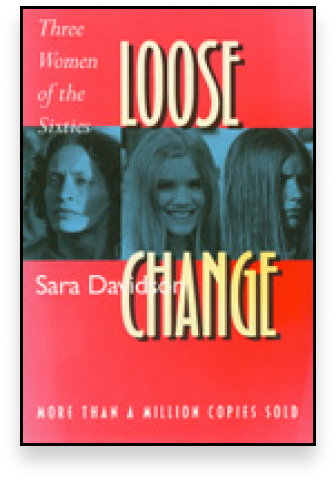
Prologue
On a rainy Saturday in 1972, I hurried into the lobby of the Prince George Hotel in lower Manhattan on my way to a seminar on Eastern meditation. A small woman walked ahead of me to the desk. She asked for the same seminar and was directed to a dark corridor. I followed her into an elevator. She turned. I dropped my eyes.
“Sara,” she said. I looked up and started. It was Natasha Taylor, whom I had not seen in eight years.
We had lived together at the University of California at Berkeley in the early Sixties, and Tasha had been the most beautiful creature I had known or seen. At a time when most girls had short, pixie cuts, Tasha had white-blond hair that fell in a sensuous swirl to her waist. Her hair was longer, richer and blonder than anyone thought hair could be. She seemed the image of the California girl pushed to its extreme of perfection: sun-washed limbs, turquoise eyes, a tiny, supple frame and a laugh like tinkling glass chimes.
I had loved her and hated her, envied her and always felt proud to be seen with her, but at the end of our senior year, we fought about who owned a rickety table in our apartment. I had given the table to a friend. “Thanks for asking me,” Tasha said, hurt and imperious. We packed our belongings in silence. I left for New York and although I knew Tasha was planning to move there also, I was afraid to call her because she would be angry about the table. So I never called and never ran into her, but each year when the new phone book arrived, I checked to see if she was listed.
When I married, at twenty-four, I took pleasure in noting that Tasha apparently was still single. A year or so later, I dialed her number late at night and when a frightened voice said “Hello?” I hung up. Gradually I forgot about her and had long since dropped the phone book ritual when the doors slid shut on us in the elevator of the Prince George Hotel.
What I saw this morning in 1972 was not the vision of perfection I remembered. Tasha’s hair was not white-blond and long; it was light brown and cut to shoulder length. She looked pale, had gained weight, and there were lines by her turquoise eyes that gave them a sad, defeated look.
“Tasha, you look beautiful.”
She studied me as if making a sincere evaluation. Then she said, “You look the same.”
Hours later, we sat fingering the silverware on the table of a coffee shop. Where to begin? How did you ever get interested in meditation? At Berkeley we were atheists. Do you remember . . .
Tasha said, “I remember you used to cook flank steak. Marinate the flank steak. Do you still do that?”
“No. I don’t remember eating flank steak.”
“When I read your article about the communes, I wanted to call you.”
“Why didn’t you?” I asked.
“I thought we’d have nothing to say.” Awkward pause. “Do you ever hear from Susie Berman?”
“Not in years. But I saw a picture of her in a book about revolutionaries. She looked truly terrifying.”
Tasha clicked her tongue and laughed. “She’d probably shoot me on sight!”
Tasha showed me a photograph of the man she was living with. He was an artist I had not heard of. “He’s older. I don’t want you to be shocked when you meet him.” She asked what my husband’s name was. She had not heard of him, “but I don’t listen to the radio,” she said.
Whenever I am asked how I came to write this book, I return to that moment when I came upon Tasha in the elevator of the Prince George Hotel. It was a moment in which life freezes. One notices details. A door opens; a curtain flutters in the wind. In the weeks that followed our meeting, my mind returned to the time when Tasha and I had been in Berkeley and had been young.
In that time, that decade which belonged to the young, we had thought life was free and would never run out. There were good people and bad people and we could tell them apart by a look or by words spoken in code. We were certain we belonged to a generation that was special. We did not need or care about history because we had sprung from nowhere. We said what we thought and demanded what was right and there was no opposition. Tear gas and bullets, but no authentic moral opposition because what could that be? “When you’re older you’ll see things differently?” We had glimpsed a new world where nothing would be the same and we had packed our bags.
Questions for Discussion:
“The book is witty, sad, incisive, and totally clean of sociological cant or the pomposities of a certain kind of generalizing journalism. . . . It has the resonance of a good novel.”
—Dan Wakefield
“Sara Davidson is an expert witness. . . . Now, more than 10 years after leaving Berkeley, she has followed up on some of her friends, and presents an absorbing and carefully detailed account of their lives up until now… Every bit of it fascinating.”
—Diane Johnson
“What I like most about Davidson’s book is that it examines individuals in the midst of social change instead of subjecting us to another dreary ‘wide- ranging’ analysis of social movements in which the individuals are viewed as ants.”
—The Washington Post
“She has written personal histories that will demand and earn your attention and respect.”
—Carol Felsenthal
About Books
